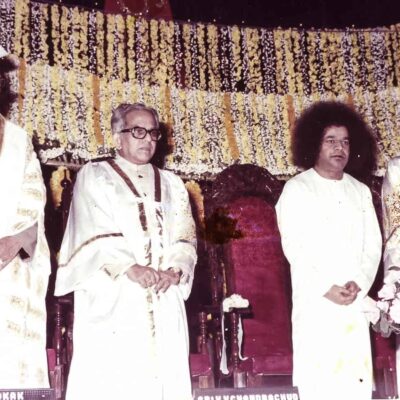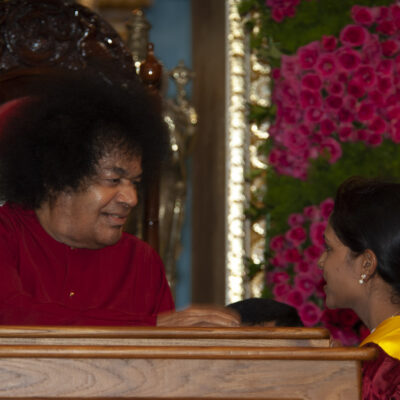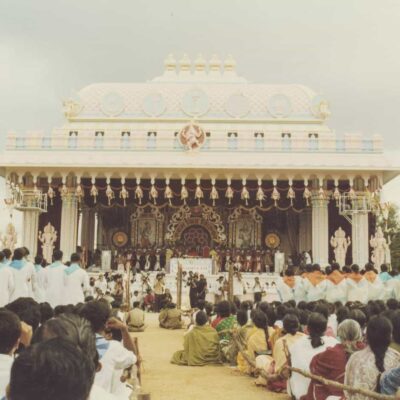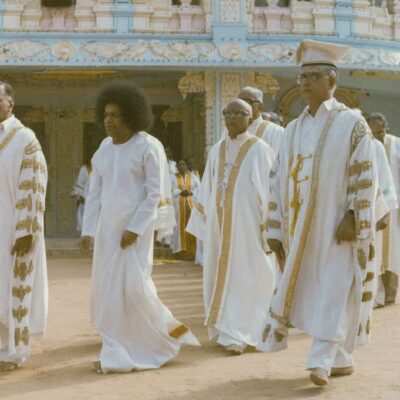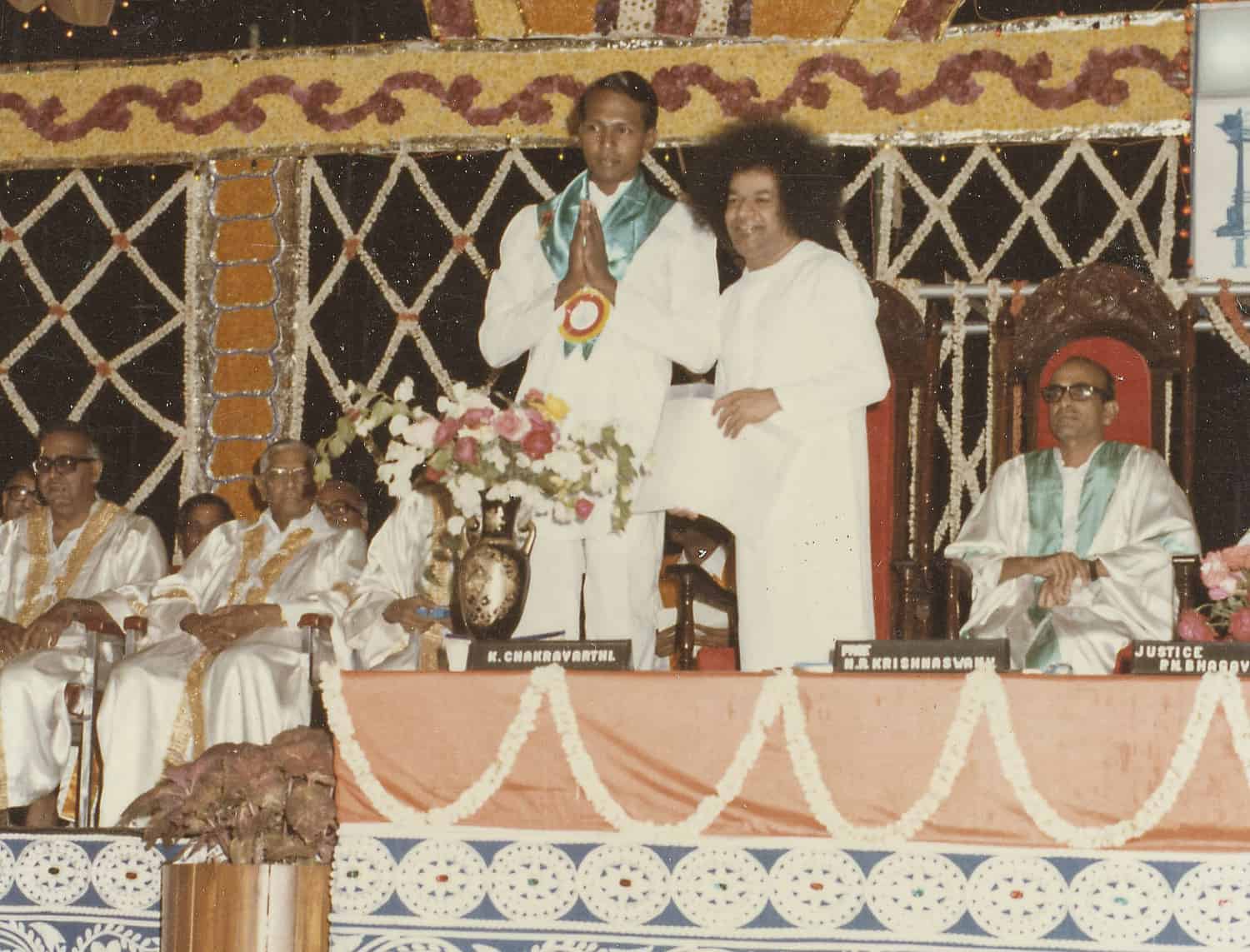
SSSIHL III Convocation Discourse – 1984
Audio excerpt of the Divine Discourse by Bhagawan Sri Sathya Sai Baba during the SSSIHL Annual Convocation
In the days of yore there were those outstanding personalities and skilled figures, the rishis and sages who could communicate the quintessence of the Vedas and the texts and bring home the cherished lessons embodied therein to the pupils. They were not only highly accomplished teachers but at their command even a lifeless entity such as a stone would spring to life and acquire the skills which were being given, skills of varying dimensions and varying descriptions. Today too there are these outstanding personalities, men of high accomplishments and achievements, who could make others transcend their limitations and lead them from the front. But what is the use, if the pupils of today do not respond and reach out to the cries and the need of the situations?
Listen to this, O students!
After passing through this “gurukul” stage and being on the threshold of entering into the household stage there are these people to whom you have to listen, for they are your well-wishers who look towards your peace and prosperity. Education does not mean getting the know-how of the alphabet. What is learnt has to be practised and shown in your daily life thereby sanctifying your life, and you must try to understand the inner purpose of life. Education, you should understand, has as its corner stone the guiding principle whereby you could remove yourself from sorrow and difficulties and move on to a higher path. If you have to communicate an idea in the medium of words there is this word ‘Samhita’ which goes on to show that the choice of words for communication should be clear cut, and precise such that the ideas contained are got. This word Samhita is also called Sandhi. In this educational fields there are four types of Samhita. They are: (i) Loka Samhita, (ii) Aloka Samhita, (iii) Vijnana Samhita, (iv) Praja Samhita. One pertains to the world, the second that is called Aloka, the third pertaining to science and the fourth pertaining to the people.
What you have beneath you is the earth. You have the world of the stars above you. That which brings these two together is the wind, and after bringing together thus, that which takes the form is the sky. Earth is one which is at the beginning, and these stars come at the second place. But then there is a force of attraction between the earth and the world of the stars. We could say that the earth is attracting the stars above or the nether worlds below. So, that which has got a greater capacity to attract and wield its course is what attracts the second body. Between the earth and the nether worlds there are seven types of winds.
The first is called Navaha,
the second is called Pravaha,
the third is called Anuvaham,
the fourth is called Samham,
the fifth is called Vivaham,
the sixth is Pravaham,
the seventh is Praviham.
The first lesson given to students is that it is these categories of winds which link the earth below to the stars above. By seeing the stars and the clouds it is said that the sky goes into ecstasy and she basks in the rays of the Sun. The first lesson contained in the Sikshavalli is that there is link between earth and the stars. The second is called Aloka Samhita. This is also called Jyoti Samhita. Below you, you have fire. Above you, you have the Sun. The link between the fire and the Sun is water, and in this light of the Sun you have the lightning. The fire and the earth, and this lightning streaks emanating from the Sun, there again is a link between the two. Thereby you have water. One who gets to know the nature of this water would certainly understand the nature of the world around us. It also says that one who has grasped this water would have grasped the world itself. So, the second lesson is that there is this link between the fire and the sun and that is how the human existence also comes into being. In the vedas we have references to the fact that the moon in linked to the mind and the heart, and the Sun is linked to the eyes.
The third Sainhita is called Vignana Samhita. Here the guru is the first entity. The pupil is called Uttara. There is this link, the relationship between the guru and the Sishya, because the pupil and the teacher come together and what emanates is Vidya. It also proves that for a human being it is not merely the worldly skills that are important, rather it is the knowledge of the Atma that is truly important. It also cautions that in addition to the worldly knowledge, what is of paramount importance is the spiritual knowledge. It also tells us that through this process of education an individual could transform himself or herself into a lighthouse so as to dispel the darkness around him or her. With limitless desires, with meaningless anxiety, trying to seek that which cannot be sought, these words would verily become the beacon for the lost soul. These are, “Speak the truth”, “Tread the path of Dharma, without any fault or shortcoming try to further your understanding”. There should not be any carelessness in accumulating knowledge. Stop doing evil. Try and do that which you can talk about. You have to lead a disciplined life and you are bound by the conduct upheld by the Society. While in the household stage, in tune with your capabilities, act charitably. Be obedient and humble before elders. In the execution of a task or in the discharging of your duties and responsibilities you should move about without any carelessness or laxity. It also tells us that these are the sacred injunctions students should always bear in mind for transforming themselves into divine entities. But unfortunately, such thoughts and ideas are nowhere to be traced in the minds and hearts of students of today. A student should never think that studying is merely for the sake of getting a job. He should understand the truth that this education is meant to give him knowledge supreme. Today’s education renders the educated into a selfish person. It makes him a slave to his senses. As a result, he forgets the divine spark within him, and the education of today is leading to such troubles and chaotic conditions all around. Today’s educated person does not come forward to assist the grief-stricken and those who are suffering. He forgets the fact that he is born in the society and is very much its part and parcel. He tries to lead a life in isolation like a drop of oil over the surface of water.
Today the educated man has no room for broad mindedness. He becomes petty and narrow minded. He should also understand that this is not what marks out an educated person.
Even after 37 years of Independence, there is still the attitude of a slave in every Indian. The advances made in science and technology are not being put to use for the betterment of people at large nor are we trying to find out how best we can tap the resources in terms of scientific and technological developments. The educated people are trying to take a distorted view of the advances made in science and technology for destructive purposes. But then this is not the fault of the students alone. The Government has not come forward to encourage the students to go on constructive ways. Neither has it made any effort whatsoever to fill the hearts and minds of young students with noble and lofty ideals. In the educational institutions of today you don’t have ways and means by which a student is trained to face the challenges which the world throws against him. He is educated, he has got a certificate; but he is still a slave, he has not cared to rid himself of his bondage. Freedom does not connote moving about aimlessly like the animals in the street. Fill your time with good cause taking path of truth. A life led thus is led thus is indeed a life of fulfilment. Understand this once again. Education is not merely for the sake of degrees. This is a mistaken notion. The man of today goes out of his way to secure his rights; but he does not bother about what his duties and responsibilities are. When you want your rights but don’t want to discharge your responsibilities you lose the rights given to you. The rights on the one hand and the duties and responsibilities on the other are inseparably linked with each other.
Then there is the element of love that has to be taken into account. Love and law, these again go together. Today’s man looks upon love as one of the guiding principles but he forgets the fact that the law also has to give as to how best you can tap and use your love. In the spiritual domain too those who are believers keep aspiring for peace and joy and happiness, but they do not know how to go about these. You don’t need God. You don’t think that you need have devotion. But then you want that God should confer on you peace, joy and happiness. God is not such a blind person. God is one who is more well versed than you. You go to a shop; you want to buy a thing. In order to get the thing, you have to pay some price from your side. Only then you can get the thing. In the same manner if you want to secure for yourself this commodity called peace, there is something that you should give. So if you want to secure santi or peace, then try to lead a life which is in tune with this aspiration. Taking to ways which are bad and following the path of adharma, how can you get santi, peace or happiness? This is merely a vain wish. How can one who eats a mango get the flavour of another fruit? The fruit will be in tune with your karma. In terms of your thoughts, God would grace you. So let your ideals be high and noble.
Let your actions be in tune with dharma. Only then you can get the right to understand the inner significance of educational philosophy. In today’s educational philosophy, there is no place for trust and humaneness. The bee is said to have a very pointed nose. It is said that it can go through a hard obstacle it can make its way through a hard object like a piece of wood. But the same bee, once it gets into a lotus and the lotus petals fold up, then it cannot extricate itself. It becomes forgetful of its stings and loses its life. In the same manner, man has become forgetful of his divine power within him. As a result, he succumbs to the difficulties, troubles and agitations, in the process, disintegrating and collapsing. Today’s student should strive and bring to fore the qualities within him. He believes the novels. He goes by the drama. He goes by the newspaper. He goes by what the man in the street has to say. But he does not believe in God. He does not go by what God has to say. This could be classified as very unfortunate. One accomplished person says “Today is Sunday” The student goes by these words and tries to experience leisure and relaxation. A pundit who says “Today is Ekadasi”; You can by that word undertake fasting. So also, in terms of what a Vedantin says “Today is Amavasya”, you go about performing the day in a proper manner. But then you do not go by this word, this injunction given to you that “Oh Child, you are really Brahman”. The educated person does not place trust in words like these which bring home to him his divine nature. Rather he goes by what the world has to offer in terms of his mechanical existence.
At the very outset, educated persons should understand the truth that this education is not for the sake of filling their stomach. In the Ramayana, we have an illustration of a very interesting person. Through this character, the Ramayana brings home to us a lesson. Who is this person? This person is Kabanda. His form is very peculiar. His head is in the stomach. There is an inner significance to this. It means that man is using his head for the purpose of his stomach. His hands and limbs are very long and powerful. By means of these long hands of his, he used to secure within his grasp whatever he could reach and ate it. What is the inner meaning of this? He is not utilising them for the sake of others in the society around him, for the betterment of his fellow beings or for being of use to others. So, if you understand in today’s context, you will find that our behaviour or mannerism is in tune with Kabanda’s so much so that we are brothers of Kabanda. But then we are not Kabandas. We are related to God. With this divine nature that is ours, with this relationship that we have with the divine, we should try and become self-sufficient and self-reliant. Just as you have the streak of lightning across the dark clouds, so also alongside education, you must have the streak of Jnana. Today we pride ourselves that we are educated; but, no trace of education is to be found. So if you really want yourselves to be qualified to be called educated, then let your life be one where everything is good and noble. When you see people suffering, go and help them. This is the Truth.
Today’s education has become mechanical. There is no place for skill. There is no place for creativity. How can we know the uniqueness of the significance of education? Education means effulgence and splendour. The nature of this effulgence is that it dispels the darkness around you. We are blind because we are deliberately closing our eyes. We have established educational institutions to impart an ideal education to students of today and to mould them into citizens of tomorrow. There are many who tend to believe that our students are proficient only in doing bhajans, worship or taking up the spiritual path. But this is a mistaken notion. Our students are trained in every aspect of their existence the physical, ethical, moral, political, intellectual, scientific, spiritual and the like, and we can also add to these fields, music, literature, dance. drama and all the arts Fine Arts. A true illustration of the accomplishments of our students is the pots filled to the brim, that do not spill out the liquid. They remain steady. This outward appearance is mistaken as a sign of weakness. Our students do not exhibit what they have. Our students are sure that ego has no place in their existence. One who wants this exhibitionism is the one who wants to go after everything in this material world. Of course, in a handful of cooked rice, you may have a pebble or two. It could be true of our students also. We should not take this to be the general nature of our students. So, our students are embodiments of high ideals. Knowingly or unknowingly they might commit some faults and mistakes. But once they know what they must do, they would certainly uphold the truth proper. Our educational institution is making an endeavour to have thousands of these students spread themselves to all the parts of the world in a few years. The uppermost thing for the students is that they should further this moral aspect of ours. Today, morals and ethics are at a low count. In today’s educational system, there should be classes set apart for moral and spiritual education.
Today’s educational system aims at giving a degree to the students. As a result, the number of the unemployed increases. In every educational institution, there should be a job orientation and if this be given, a student would be encouraged and enthused to assimilate all that is given to him. But what they learn is not giving them a job. Nor are the students themselves interested in job-oriented education.
That is why the life of students is being frittered away like this. We should not waste any time of the student. In our educational system here, right from 5AM in the morning to 10PM in the night, students have something or other to do. There are marks assigned for everyone of their activity. In this manner, facilities are provided so that they are not to waste their time on any account. In this process, they are learning more and more. Time is everything. Time wasted is life wasted. Do not waste time. In these three sentences is contained their activities from morning till night. But in the general scheme of things, students go to the colleges without knowing why they go there. Not only do they stop learning things, but they develop an interest in the material world around them. Such people can they be called students? After entering as students, they are becoming people craving for material things. This is not a true trait of education.
In ancient India, after students have done their studies and are on the threshold of entering the life of a house holder, the gurus address an assembly of students so that they could impart to them the best ways and means of carrying out these duties. The purpose of the Convocation is to equip the students with their beacons, the guiding stars. The words of the gurus are verily the beacons. This is the true purpose of a convocation. But in today’s world a convocation has become a place of agitations and unruly behaviour and these in turn lead to a life which has no meaning at all.
Today’s students are the builders of tomorrow. But they have lost track of their purpose and they are indulging in destructive activities. What is the cause for this? Who is responsible for this? If you look deeper into this, you will realise that the parents are responsible for this. They may have love all right. It is natural for the father to love his son. But, even this love has a certain constraint. Dhritharashtra loved his children. A son who goes astray should be controlled and cautioned by the parents. Along with love, he should also have a means to punish him. The elephant should have the goad, then only will it listen to the master. The horse should similarly have the reins so that you could hold the horse. So, along with what is laid down, there should also be a means of punishment. Only then, the two can go together, But, no parent of today is making an effort in this direction. They are all the while carried away by love towards their children. Along with love they should insist on the conduct. The children may not know but the parents should tell the children what they should do. The parents say things like: “I have left my son to himself for whatever he wants to do”. This is a cowardly act. Tomorrow if he goes astray and brings disrepute to the family and the parents, who will be responsible for this? So, we should try to mould the child so that he brings up the name and fame of the family. The name and reputation is important. “What is in a name?” you might say. We say that if the city has got a good name the citizens are good. If you are good the town itself gets a good name. How do you get a good name? through your behaviour. It is not mere intellectual excellence but your qualities that are truly important. So, try to further these qualities, not your wealth or money. Money is also necessary. In addition, you need good quality. A chariot without its two wheels cannot move. A bird which has not two wings cannot fly. So, you should have money and good qualities. These two go together. Our primary task is to foster these good qualities.
When you go out into the world you should not become slaves like everybody else. Now you are trying to imitate what the other man is doing. You do not understand the truth that imitation is a sign of weakness. So long as you are in the Sathya Sai Educational Institutions, being filled with good behaviour and good words you remain good. But once you go out into the world you go about a changing process. You grow long hair, grow mustache and a beard and you are like a beggar. Does not a cockroach have this mustache or a rat its whiskers? What is the use of your calling yourself a man? Such weaknesses should be given up. What we are, should be shown, in what we do. You get carried away by your education or your money. These are not yardsticks of your greatness. Your behaviour is the yardstick for your greatness. So, students who are embodiments of love, even if you go to the world, what you learnt here, the good and the noble ideals, try to put them into practice in the world outside. Believe that this is the true Vidya that you must have.
In the sacred assembly of the Convocation whatever you have heard, whatever has been given to you in the form of injunction, let them be the very life breath of you. Try to become ideal models to the world outside, by translating this message in your daily life there.
Audio Source: Sri Sathya Sai Media Centre, Radio Sai Archives
Transcript Source: ‘Benedictory Addresses’ (Edition: May 2011), published by Sri Sathya Sai Sadhana Trust, Publications Division


